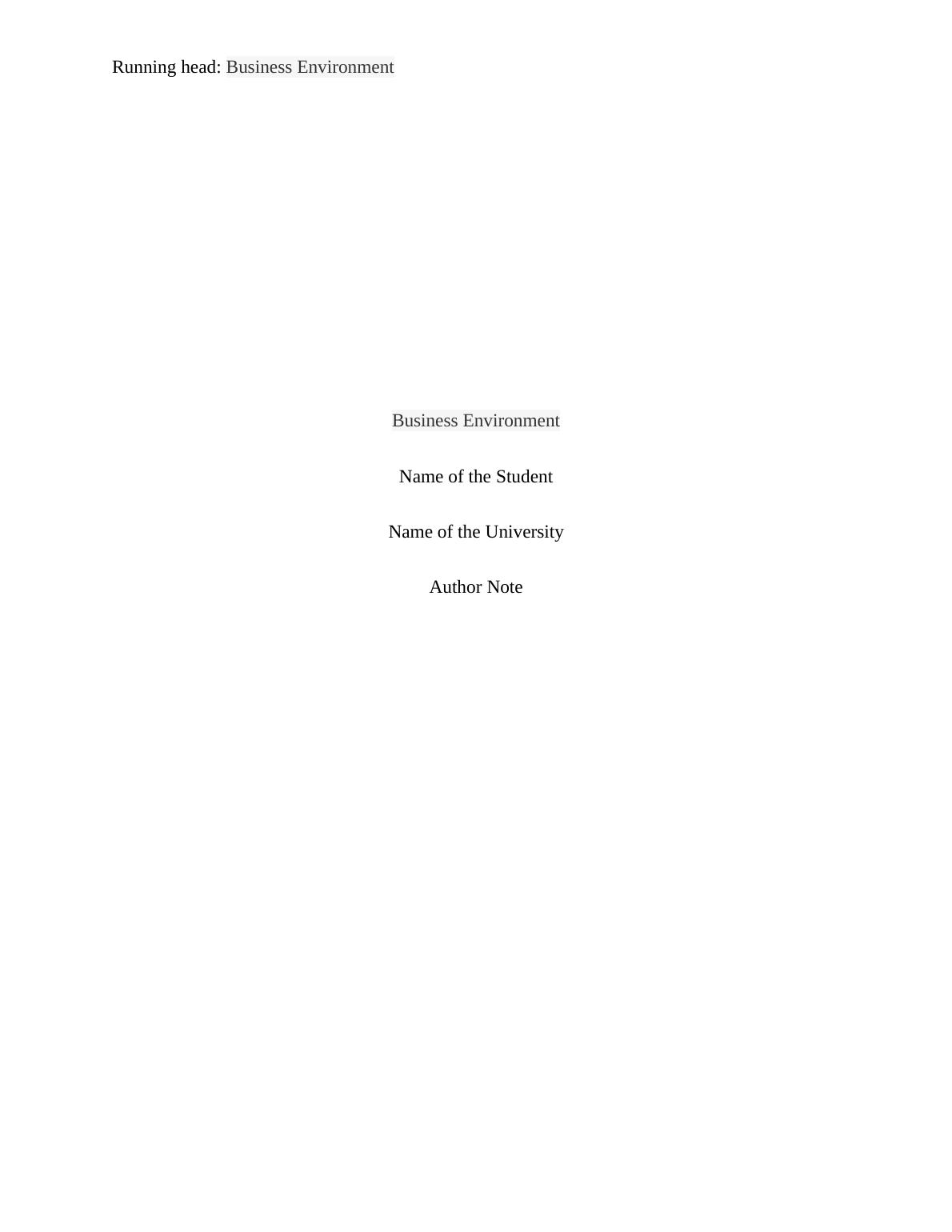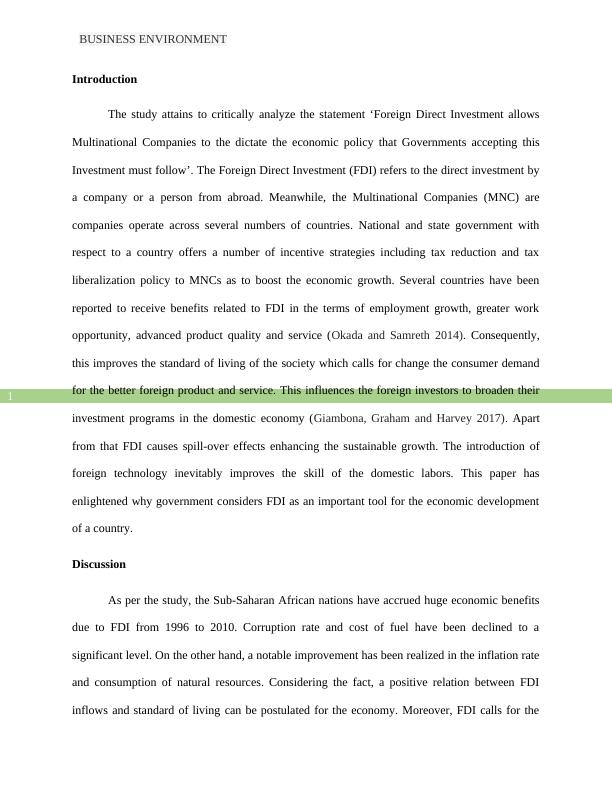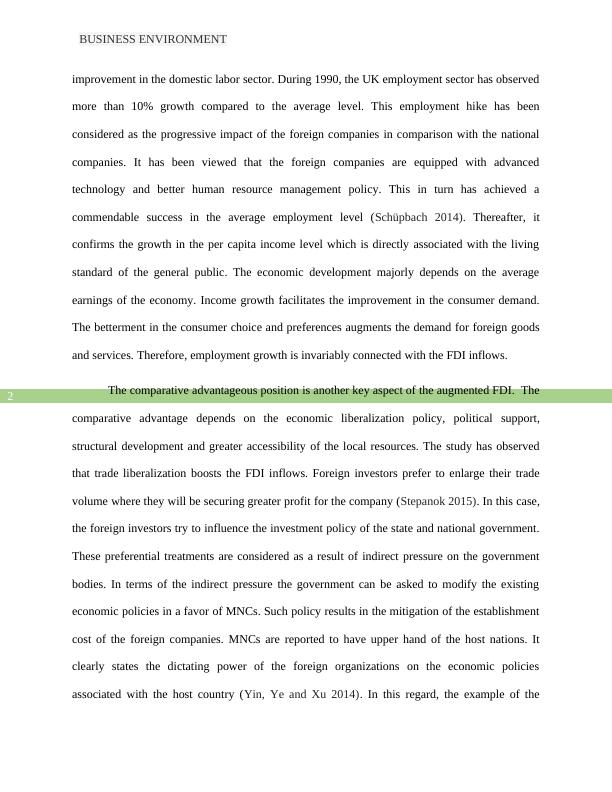Business Environment - Definition
10 Pages2792 Words19 Views
Added on 2022-08-26
Business Environment - Definition
Added on 2022-08-26
ShareRelated Documents
Running head: Business Environment
Business Environment
Name of the Student
Name of the University
Author Note
Business Environment
Name of the Student
Name of the University
Author Note

BUSINESS ENVIRONMENT
1
Introduction
The study attains to critically analyze the statement ‘Foreign Direct Investment allows
Multinational Companies to the dictate the economic policy that Governments accepting this
Investment must follow’. The Foreign Direct Investment (FDI) refers to the direct investment by
a company or a person from abroad. Meanwhile, the Multinational Companies (MNC) are
companies operate across several numbers of countries. National and state government with
respect to a country offers a number of incentive strategies including tax reduction and tax
liberalization policy to MNCs as to boost the economic growth. Several countries have been
reported to receive benefits related to FDI in the terms of employment growth, greater work
opportunity, advanced product quality and service (Okada and Samreth 2014). Consequently,
this improves the standard of living of the society which calls for change the consumer demand
for the better foreign product and service. This influences the foreign investors to broaden their
investment programs in the domestic economy (Giambona, Graham and Harvey 2017). Apart
from that FDI causes spill-over effects enhancing the sustainable growth. The introduction of
foreign technology inevitably improves the skill of the domestic labors. This paper has
enlightened why government considers FDI as an important tool for the economic development
of a country.
Discussion
As per the study, the Sub-Saharan African nations have accrued huge economic benefits
due to FDI from 1996 to 2010. Corruption rate and cost of fuel have been declined to a
significant level. On the other hand, a notable improvement has been realized in the inflation rate
and consumption of natural resources. Considering the fact, a positive relation between FDI
inflows and standard of living can be postulated for the economy. Moreover, FDI calls for the
1
Introduction
The study attains to critically analyze the statement ‘Foreign Direct Investment allows
Multinational Companies to the dictate the economic policy that Governments accepting this
Investment must follow’. The Foreign Direct Investment (FDI) refers to the direct investment by
a company or a person from abroad. Meanwhile, the Multinational Companies (MNC) are
companies operate across several numbers of countries. National and state government with
respect to a country offers a number of incentive strategies including tax reduction and tax
liberalization policy to MNCs as to boost the economic growth. Several countries have been
reported to receive benefits related to FDI in the terms of employment growth, greater work
opportunity, advanced product quality and service (Okada and Samreth 2014). Consequently,
this improves the standard of living of the society which calls for change the consumer demand
for the better foreign product and service. This influences the foreign investors to broaden their
investment programs in the domestic economy (Giambona, Graham and Harvey 2017). Apart
from that FDI causes spill-over effects enhancing the sustainable growth. The introduction of
foreign technology inevitably improves the skill of the domestic labors. This paper has
enlightened why government considers FDI as an important tool for the economic development
of a country.
Discussion
As per the study, the Sub-Saharan African nations have accrued huge economic benefits
due to FDI from 1996 to 2010. Corruption rate and cost of fuel have been declined to a
significant level. On the other hand, a notable improvement has been realized in the inflation rate
and consumption of natural resources. Considering the fact, a positive relation between FDI
inflows and standard of living can be postulated for the economy. Moreover, FDI calls for the

BUSINESS ENVIRONMENT
2
improvement in the domestic labor sector. During 1990, the UK employment sector has observed
more than 10% growth compared to the average level. This employment hike has been
considered as the progressive impact of the foreign companies in comparison with the national
companies. It has been viewed that the foreign companies are equipped with advanced
technology and better human resource management policy. This in turn has achieved a
commendable success in the average employment level (Schüpbach 2014). Thereafter, it
confirms the growth in the per capita income level which is directly associated with the living
standard of the general public. The economic development majorly depends on the average
earnings of the economy. Income growth facilitates the improvement in the consumer demand.
The betterment in the consumer choice and preferences augments the demand for foreign goods
and services. Therefore, employment growth is invariably connected with the FDI inflows.
The comparative advantageous position is another key aspect of the augmented FDI. The
comparative advantage depends on the economic liberalization policy, political support,
structural development and greater accessibility of the local resources. The study has observed
that trade liberalization boosts the FDI inflows. Foreign investors prefer to enlarge their trade
volume where they will be securing greater profit for the company (Stepanok 2015). In this case,
the foreign investors try to influence the investment policy of the state and national government.
These preferential treatments are considered as a result of indirect pressure on the government
bodies. In terms of the indirect pressure the government can be asked to modify the existing
economic policies in a favor of MNCs. Such policy results in the mitigation of the establishment
cost of the foreign companies. MNCs are reported to have upper hand of the host nations. It
clearly states the dictating power of the foreign organizations on the economic policies
associated with the host country (Yin, Ye and Xu 2014). In this regard, the example of the
2
improvement in the domestic labor sector. During 1990, the UK employment sector has observed
more than 10% growth compared to the average level. This employment hike has been
considered as the progressive impact of the foreign companies in comparison with the national
companies. It has been viewed that the foreign companies are equipped with advanced
technology and better human resource management policy. This in turn has achieved a
commendable success in the average employment level (Schüpbach 2014). Thereafter, it
confirms the growth in the per capita income level which is directly associated with the living
standard of the general public. The economic development majorly depends on the average
earnings of the economy. Income growth facilitates the improvement in the consumer demand.
The betterment in the consumer choice and preferences augments the demand for foreign goods
and services. Therefore, employment growth is invariably connected with the FDI inflows.
The comparative advantageous position is another key aspect of the augmented FDI. The
comparative advantage depends on the economic liberalization policy, political support,
structural development and greater accessibility of the local resources. The study has observed
that trade liberalization boosts the FDI inflows. Foreign investors prefer to enlarge their trade
volume where they will be securing greater profit for the company (Stepanok 2015). In this case,
the foreign investors try to influence the investment policy of the state and national government.
These preferential treatments are considered as a result of indirect pressure on the government
bodies. In terms of the indirect pressure the government can be asked to modify the existing
economic policies in a favor of MNCs. Such policy results in the mitigation of the establishment
cost of the foreign companies. MNCs are reported to have upper hand of the host nations. It
clearly states the dictating power of the foreign organizations on the economic policies
associated with the host country (Yin, Ye and Xu 2014). In this regard, the example of the

End of preview
Want to access all the pages? Upload your documents or become a member.
Related Documents
Business Level Strategy - PDFlg...
|9
|2105
|138
Business Across Borders in Sri Lanka: Challenges and Opportunitieslg...
|17
|554
|357
FDIs and Country Attractiveness in Vietnam - UNCTADlg...
|6
|1387
|274
Technology Transfer through FDI in Indialg...
|11
|5315
|22
Impact of FDI on Employment in Indialg...
|9
|2385
|410
International Business- Essay 3lg...
|5
|1069
|214
